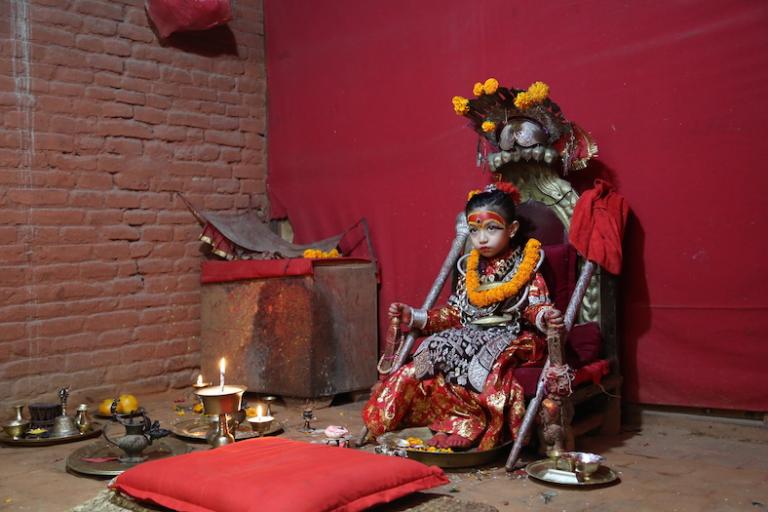
Asay: As you go through the season, or even the entire run of the series, what has been the thing that moved you the most? What have you found the most interesting?
Freeman: That’s two different questions.
Asay: I know!
Freeman: I was just thinking about Kathmandu and the living goddess. … the Kumari. Every few years, [some Hindus in Nepal] designate a baby—2, 3, 4, years old—as a living goddess, a living representative of a god. And she reigns … until she reaches puberty, and then she reverts back to a real person: Just another young lady. That’s a fascinating when you think about it. A family is chosen to harbor this entity. Think about it for a minute. If you have a child, and you live in this kind of belief system, and the elder comes to you and says, ‘Your child has been chosen.’ Is it a blessing? Is it a problem? Scary? What is your reaction to it?
I was blessed by her—a living goddess—so the fascination with the idea won’t go away.
Younger: It gets me thinking about these stories about how people are transformed by religion or faith. The [tradition of the] Kumari is interesting in some ways, because it can be seen as both a blessing and a curse on a young girl, to be honored as a god, but also to be so restricted in her normal youth. … but despite those possible negatives, it has this lifelong status as someone who is really special. She gets to live like that her entire life.
It also reminds me [of] Season One, when we got to film the Kindaalda, the coming of age ceremony for the Navajo. And seeing this young girl who is wrapped up in this ritual and not quite sure what’s going on, and staying up all night in a hut, and then finally running across the plain through these scrub bushes at sunrise. In that moment she is liberated and becomes a woman. So powerful, these stories of transformation of faith.
Freeman: And these American rituals are ancient. It’s been going on for time immemorial.
Asay: Lori, I understand that you’re a Christian. How has this program impacted your own faith?
McCreary: I think in a couple of ways. Sometimes I’m surprised and moved by the depth of devotion and connection that someone from another religion finds with God. And the ways they [experience that connection], whether it’s with chanting or meditating, or dancing or singing. A lot of these other religions have a daily practice, and in the Christian church—at least in America—it’s more of a weekly thing. And for me I’ve been more inspired to make a daily practice of meditation and prayer. When you travel around the world and you see so many people doing so many great things it’s inspiring. And it makes me want to make it more a part of my daily life.
[I was also struck by] when we were allowed to go to Megiddo in Israel, where we got to see one of the earliest references to Jesus as God, in writing. and then find out that [it was made at] a time when it was a woman’s home. The writing was in her home. I just find those kind of great surprises [marvelous]. Even if we just had that, and we weren’t actually making the series, it would be worth it.












